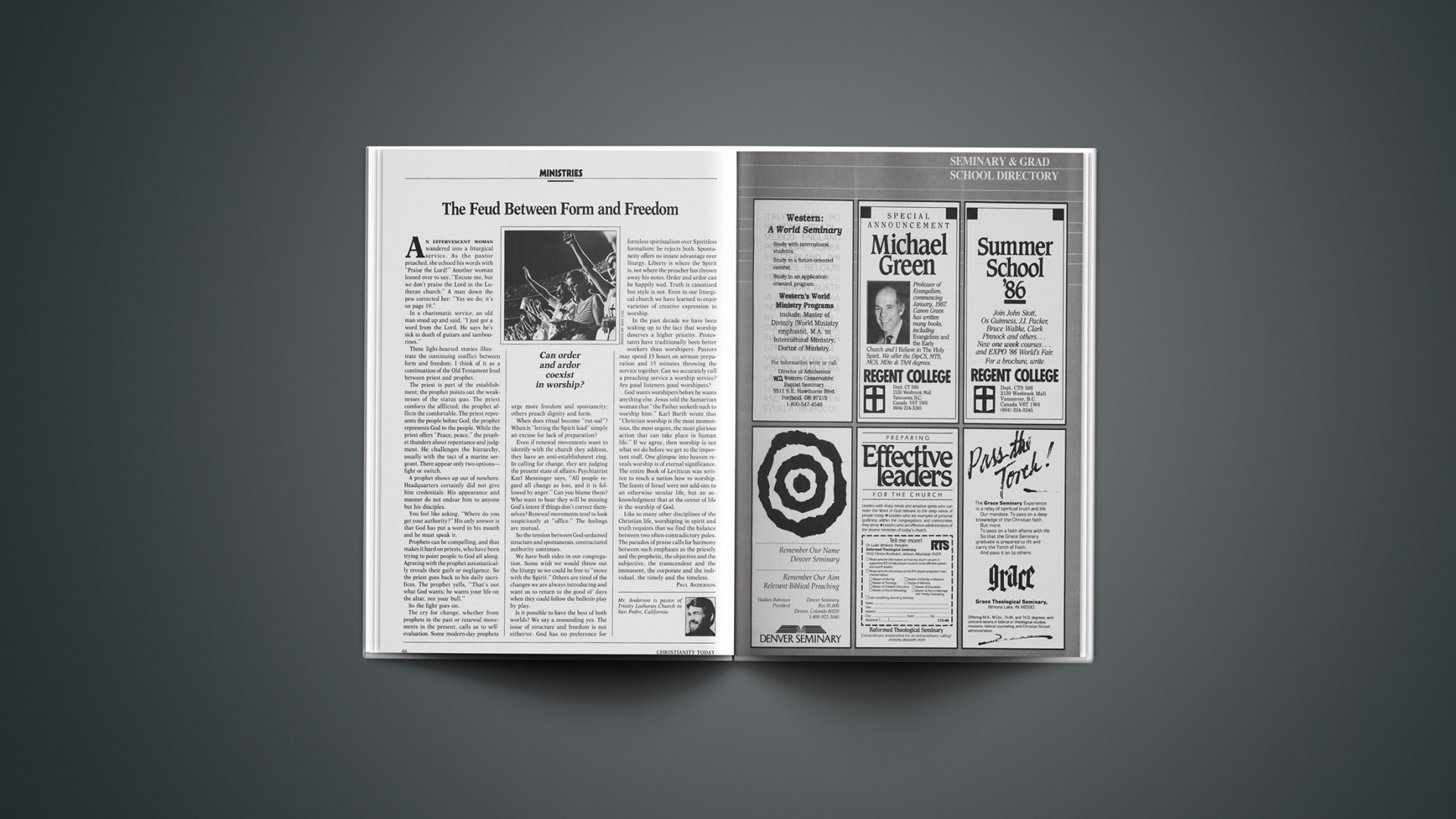An effervescent woman wandered into a liturgical service. As the pastor preached, she echoed his words with “Praise the Lord!” Another woman leaned over to say, “Excuse me, but we don’t praise the Lord in the Lutheran church.” A man down the pew corrected her: “Yes we do; it’s on page 19.”
In a charismatic service, an old man stood up and said, “I just got a word from the Lord. He says he’s sick to death of guitars and tambourines.”
These light-hearted stories illustrate the continuing conflict between form and freedom. I think of it as a continuation of the Old Testament feud between priest and prophet.
The priest is part of the establishment; the prophet points out the weaknesses of the status quo. The priest comforts the afflicted; the prophet afflicts the comfortable. The priest represents the people before God; the prophet represents God to the people. While the priest offers “Peace, peace,” the prophet thunders about repentance and judgment. He challenges the hierarchy, usually with the tact of a marine sergeant. There appear only two options—fight or switch.
A prophet shows up out of nowhere. Headquarters certainly did not give him credentials. His appearance and manner do not endear him to anyone but his disciples.
You feel like asking, “Where do you get your authority?” His only answer is that God has put a word in his mouth and he must speak it.
Prophets can be compelling, and that makes it hard on priests, who have been trying to point people to God all along. Agreeing with the prophet automatically reveals their guilt or negligence. So the priest goes back to his daily sacrifices. The prophet yells, “That’s not what God wants; he wants your life on the altar, not your bull.”
So the fight goes on.
The cry for change, whether from prophets in the past or renewal movements in the present, calls us to self-evaluation. Some modern-day prophets urge more freedom and spontaneity; others preach dignity and form.
When does ritual become “rut-ual”? When is “letting the Spirit lead” simply an excuse for lack of preparation?
Even if renewal movements want to identify with the church they address, they have an anti-establishment ring. In calling for change, they are judging the present state of affairs / Psychiatrist Karl Menninger says, “All people regard all change as loss, and it is followed by anger.” Can you blame them? Who want to hear they will be missing God’s intent if things don’t correct themselves? Renewal movements tend to look suspiciously at “office.” The feelings are mutual.
So the tension between God-ordained structure and spontaneous, unstructured authority continues.
We have both sides in our congregation. Some wish we would throw out the liturgy so we could be free to “move with the Spirit.” Others are tired of the changes we are always introducing and want us to return to the good ol’ days when they could follow the bulletin play by play.
Is it possible to have the best of both worlds? We say a resounding yes. The issue of structure and freedom is not either/or. God has no preference for formless spiritualism over Spiritless formalism: he rejects both. Spontaneity offers no innate advantage over liturgy. Liberty is where the Spirit is, not where the preacher has thrown away his notes. Order and ardor can be happily wed. Truth is canonized but style is not. Even in our liturgical church we have learned to enjoy varieties of creative expression in worship.
In the past decade we have been waking up to the fact that worship deserves a higher priority. Protestants have traditionally been better workers than worshipers. Pastors may spend 15 hours on sermon preparation and 15 minutes throwing the service together. Can we accurately call a preaching service a worship service? Are good listeners good worshipers?
God wants worshipers before he wants anything else. Jesus told the Samaritan woman that “the Father seeketh such to worship him.” Karl Barth wrote that “Christian worship is the most momentous, the most urgent, the most glorious action that can take place in human life.” If we agree, then worship is not what we do before we get to the important stuff. One glimpse into heaven reveals worship is of eternal significance. The entire Book of Leviticus was written to teach a nation how to worship. The feasts of Israel were not add-ons to an otherwise secular life, but an acknowledgment that at the center of life is the worship of God.
Like so many other disciplines of the Christian life, worshiping in spirit and truth requires that we find the balance between two often-contradictory poles. The paradox of praise calls for harmony between such emphases as the priestly and the prophetic, the objective and the subjective, the transcendent and the immanent, the corporate and the individual, the timely and the timeless.
PAUL ANDERSON1Mr. Anderson is pastor of Trinity Lutheran Church in San Pedro, California.










